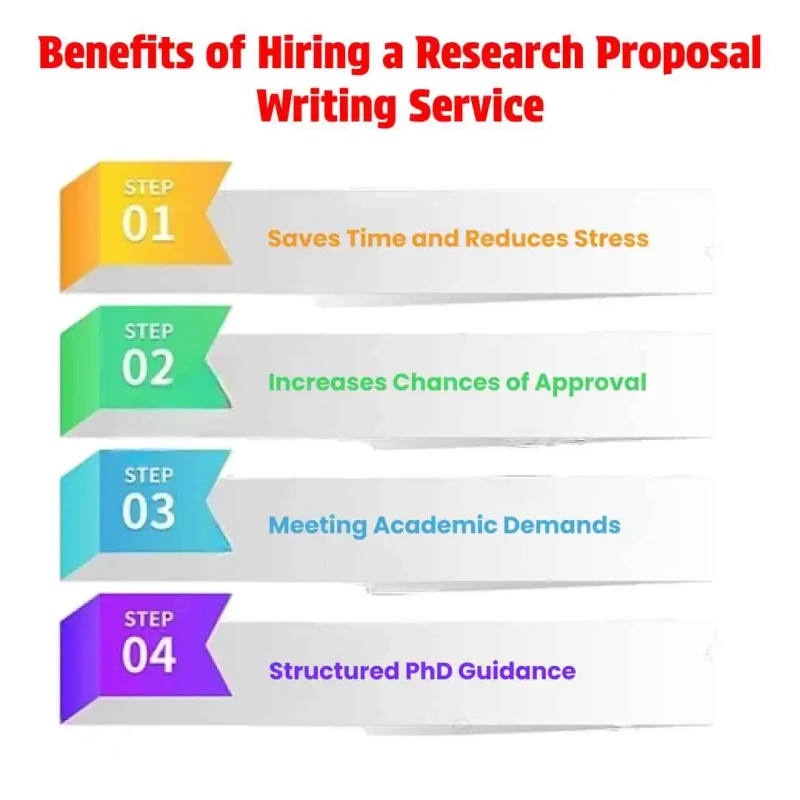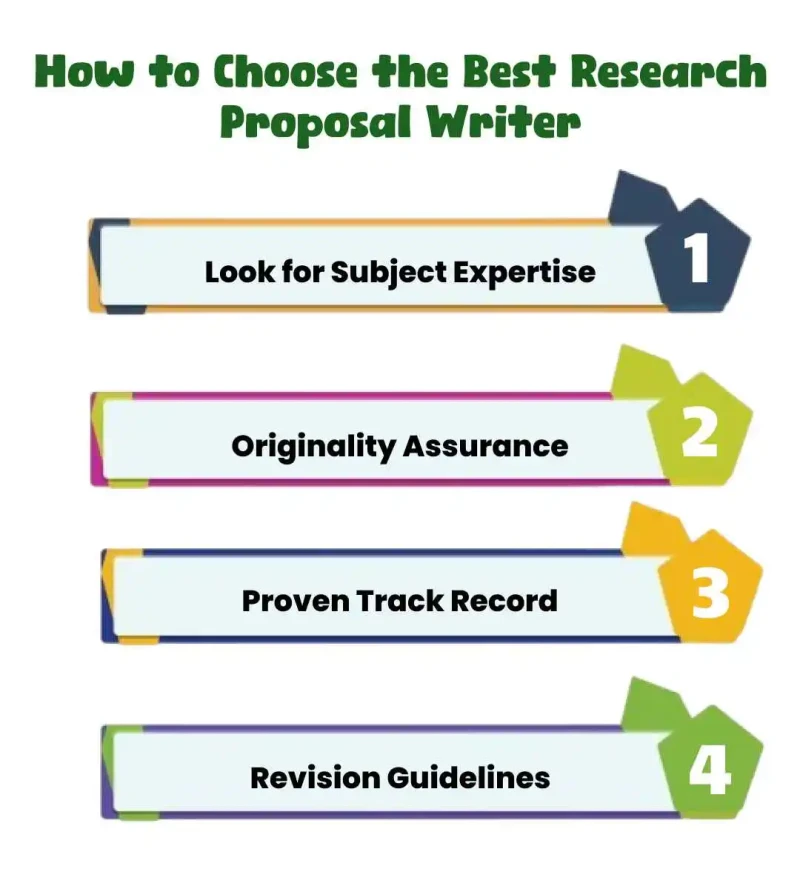Methods of Primary Data Collection in Research Methodology
Master the top methods of primary data collection in research methodology. Learn to use surveys, interviews, and experiments to gather original, high-quality data.

Annie
Crafting a strong research proposal for a PhD is the first step towards securing admissions and laying the foundation for your doctoral journey. A well-structured proposal highlights your research vision, academic readiness, and contribution to the field.
In this blog, you will discover the importance of a research proposal in PhD admissions, the essential elements, and how seeking support from a research proposal writer or choosing to purchase a research proposal could ultimately assist you in writing the best research proposal for your PhD journey.
A research proposal for PhD is a structured document that outlines your research aims, methodology, and significance in advancing academic knowledge.
Its purpose is to showcase originality, feasibility, and contribution to the field. Unlike a master's proposal, it requires greater depth and innovation.
A well-prepared research proposal for PhD must include clear, structured sections that highlight the scope, relevance, and feasibility of your research. Below are the key components every scholar should focus on:
The title should be concise yet reflective of the study’s essence. The abstract provides a brief overview of research aims, methods, and expected outcomes.
This section explains the academic and practical significance of your study. It should highlight why the research is important and how it addresses existing gaps.
Here, define the central research problem and outline specific, measurable objectives. Strong objectives guide your investigation and keep your doctoral journey focused.
This section summarizes existing studies relevant to your research topic and highlights the gaps that your work aims to address. It also helps establish the context for your research and demonstrates how your study builds on or diverges from previous findings.
To dive deeper into effective techniques and best practices, you can explore our blog on structuring the literature review.
Detail your chosen research design, methods of data collection, and tools for analysis. This demonstrates academic rigour and the feasibility of your proposed study.
Provide a realistic timeline, showing how you will manage each stage of your PhD project. Feasibility reflects both practicality and resource availability.
Conclude with anticipated results and contributions to your field. Highlight how your research will advance academic knowledge or solve real-world problems.
The proposal is based on a specific research problem. Without defining this research problem, students come up with a fuzzy research proposal. Students need experts' assistance in narrowing down their focus and articulating the research question in such a manner that it is both specific and researchable.
Overlooking previous research or disregarding gaps makes your proposal look shortchanged and less valid. Advisers help students determine valid sources and areas in which their study can provide new contributions.
A weakly designed methodology raises questions regarding the viability and credibility of your research methodology. Professional advisers help choose suitable methods, data collection, and analysis are strong and well organized.
Ignoring academic rules is a common mistake many students make when writing their research proposals. These rules exist for a reason; these rules help in maintaining honesty, clarity, and professionalism in your work. Even small issues like wrong citations or poor formatting can affect how your proposal is judged.
Many students don’t notice these mistakes early on, and fixing them at the last minute can be stressful and take up a lot of time. These errors aren’t small; they can significantly reduce your chances of getting your proposal approved. That’s why seeking professional academic help can make a real difference, ensuring your research proposal for PhD follows all the proper rules and stands out.
Working with a research proposal writer can make the difference between an average proposal and one that stands out. Professionals bring academic expertise, attention to detail, and resources that many students may not access on their own.
An expert writer helps identify and articulate clear research gaps. They also illustrate how your work helps plug those gaps. These gaps also highlight the significance of your research and put your work into perspective within the wider academic landscape.
To learn practical methods and expert tips, you can explore our blog on “How to write research gaps”.
Professional writers often have access to an extensive scholarly database, ensuring that your proposal is supported by credible, up-to-date references.
With plagiarism being a critical concern, a writer ensures originality while adhering to strict academic standards. This greatly enhances the proposal's credibility.
A strong proposal is not just about ideas, but it is also about clarity. Writers refine language, structure, and formatting to make your research proposal persuasive and easy to follow.
Choosing to collaborate with a professional or even opting to purchase a research proposal can save time, reduce stress and improve approval chances.
It is common for scholars to feel uncertain when preparing their research proposal for PhD, especially under tight deadlines and high academic expectations. Many wonder whether they can simply purchase a research proposal to ease the burden. This section clears the confusion and explains the right way to approach this option.
Free templates can provide a basic structure, but they rarely reflect the depth, originality, or alignment required for doctoral-level research.
A custom-written proposal, on the other hand, is tailored to your specific topic and meets institutional standards.
While purchasing a proposal might seem like a shortcut, ethical concerns must be considered. The key is to treat professional assistance as guidance, not a substitute for your own work. Upholding integrity is essential for academic success.
Generic, pre-made proposals often fail to impress reviewers because they lack relevance and authenticity. By contrast, collaborating with a research proposal writer gives you personalized support, helping refine your ideas while ensuring your proposal remains original and academically credible.
Professional assistance doesn’t replace your effort; it strengthens it, ensuring your proposal is ethical, well-structured, and positioned for approval.

Collaborating with a professional service can make a significant difference in crafting a high-quality research proposal for PhD. Here’s how it benefits scholars:
Drafting a PhD proposal can be overwhelming. A professional service helps streamline the process, saving valuable time and minimising stress, especially for those balancing research, coursework, or teaching responsibilities.
Expert writers understand the expectations of academic committees. Their guidance ensures your proposal is coherent, original, and persuasive, increasing the likelihood of approval.
Professional services help align your proposal with institutional requirements, formatting standards, and scholarly expectations, ensuring you meet all academic demands efficiently.
Beyond writing, these services often provide PhD guidance, advising on research design, methodology, and literature coverage. This structured support equips you with a clear roadmap for your doctoral journey.
By hiring a service or consulting a dedicated research proposal writer, scholars can focus on their research while ensuring their proposal is meticulously prepared and aligned with academic standards.

Selecting the right research proposal writer is crucial to ensure your PhD proposal is high-quality, original, and aligned with academic standards. Consider the following factors:
Choose a writer with in-depth knowledge of your research field. Subject expertise ensures your proposal is accurate, relevant, and demonstrates scholarly understanding.
Verify that the writer guarantees original work with proper referencing. Plagiarism-free proposals reflect credibility and increase your chances of approval.
Check the writer’s portfolio or client reviews. A proven track record of completed proposals indicates reliability and quality.
Ensure the writer offers clear revision policies. This allows you to request edits and refinements, ensuring the final proposal meets your expectations and institutional requirements.
By carefully evaluating these factors, you can collaborate with a professional writer who strengthens your proposal while maintaining academic integrity.
A strong research proposal for a PhD isn’t just a formality; it’s the foundation of your entire doctoral journey. It reflects your ideas, originality, and academic potential, helping you set a clear direction for your research.
We know that shaping your thoughts into a polished proposal can feel overwhelming. That’s where expert help from a skilled research proposal writer can make a real difference, offering guidance, clarity, and practical support.
Remember, getting professional support doesn’t do the work for you—it helps you showcase your ideas confidently, making your proposal compelling, credible, and ready for approval. Your PhD journey starts stronger because of it.
Master the top methods of primary data collection in research methodology. Learn to use surveys, interviews, and experiments to gather original, high-quality data.
Don’t write your methodology without reading this. Learn why purposive sampling is essential for case studies and how to define your inclusion criteria. Url:purposive-sampling
Master the chapterization of thesis to ensure logical flow. Learn the standard academic framework for organizing research into a professional, approved document.
A practical guide to sentiment analysis research papers covering methodologies, datasets, evaluation metrics, research gaps, and publication strategies.
Master data analysis for research papers. Learn quantitative and qualitative methods, cleaning, and reporting standards to ensure your study meets journal rigour.
Want to impress your peers? Discover the best ways to condense your research, avoid common mistakes, and handle tough questions at any academic conference.